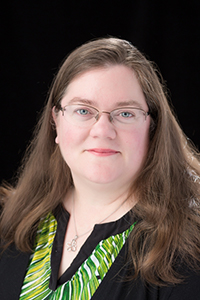Rebekah Cummings
Department: Scholars with Diverse Abilities (SDAP)
Leveraging Aportfolio for Student Learning
For students taking SPE 3060 College and Beyond and SPE 3061 Career and Practical Living, submitting material to the Aportfolio provides a means to show off their effort and skills related to career development, academic achievement, personal independence, and social engagement. Most students who take these courses do so as part of the requirements for the Scholars with Diverse Abilities Program at Appalachian State or for the Exceptional Learners Second Academic Concentration in Elementary Education. The Aportfolio serves as a cohesive way to capture the variety of assignments they have in the SPE 3060 and SPE 3061 courses as well as to showcase key learning being done in other courses and through additional opportunities provided to them through other units here at Appalachian State, such as the Career Development Office, Student Development, and more. 
Because students in these two program areas take these courses more than once, the Aportfolio serves as a means to revisit where they have been as a student and judge how far they’ve come. For example, students track progress on their self-selected goals throughout the semester and post their goal tracking documents to their Aportfolio at the end of the semester, making it available for review in future semesters. Students also post assignments they are proud of having completed for each of the courses they take each semester. Students write about social experiences they have had, such as going to football games, taking Alternative Service Experience trips, and participating in clubs. In this way, the Aportfolio provides students the chance to document and reflect on whole-person learning and then review these reflections in future semesters.
Aportfolio and Assessment
This Aportfolio process was initially designed to solve a programmatic problem. In the Scholars with Diverse Abilities Program, students must demonstrate marked progress in the areas of career development, academic achievement, personal independence, and social engagement in order to earn the Collegiate Achievement Award, the culminating award for this 2-year program offered through Appalachian State University. With just a few scholars in the program and a small staff, it was easy for staff to assess student progress and remind students how far they had come. But what if there was staff turnover during the student’s two-year program? What if SDAP expanded to a much larger number of students?
And what if the body approving our Comprehensive Transition Program asked for proof of student progress? What concrete evidence could the program provide? Programmatically, how do we show this progress from the students’ first semester until the end of their fourth semester? What method of evaluation can allow us to track that progress? How do students provide evidence that they have indeed put forth the effort to earn this award?
These were the questions mulling over in my head when I learned about Aportfolio. Over the last four years, I have created an Aportfolio template (thanks to Elaine’s help in the logistics of template creation) that allows students to demonstrate their learning and participation across the four required domains for Comprehensive Transition Programs (CTPs).
Now, students create an Aportfolio their first semester using the SDAP Template. They then submit evidence of collegiate engagement in the career, academic, personal and social realms each semester. The SDAP Template provides a framework from which students work and is designed to be completed over a two-year time frame.
Since SDAP students take SPE 3060 and SPE 3061 each semester across the two-year program, the Aportfolio submissions required in those courses each semester assure documentation of student progress. Students present their Aportfolio to SDAP staff and their parents at the end of both their first and second year, reflecting on the aspects of their growth and development that they are most proud of over that school year.
Students who take these two courses and are not part of the Scholars with Diverse Abilities Program leave the course series with documentation of their progress as well.
The SDAP Template is flexible enough to grow and expand as students move through the program while also flexibly working for students seeking their bachelor’s degrees rather than the 2- year Collegiate Achievement Award earned through SDAP.